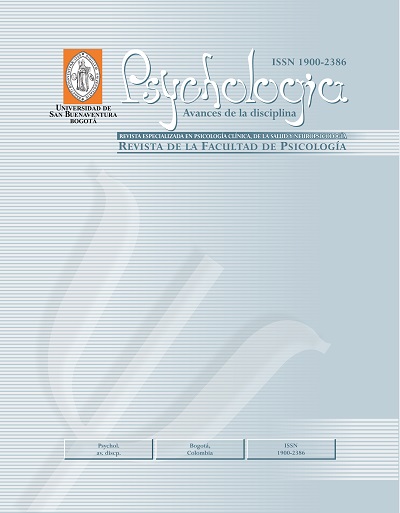This journal provides open, immediate access to its contents, based on the principle that offering the public free access to research helps to promote a higher global exchange of knowledge.
As such, all journal articles are published under a Creative Commons Attribution-NonCommercial-ShareAlike 4.0 International License (CC BY-NC-SA), by which commercial use of the original work or its possible derived works is not allowed, and the distribution thereof must be done with the same license elements regulating the original work.
http://creativecommons.org/licenses/by-nc-sa/4.0/
Abstract
The objective of this investigation was to determine the attitude toward the psychologist professional work in a Bogotá sample, according to the psychological therapy´s time. It has been made a descriptive study with a group comparative
method, and the »Attitude toward the Psychologist Professional Work” was used in a scale to a Bogotá sample of 540 people. A neutral attitude was founded, toward the psychologist professional work, highlihting a better attitude of women in comparation with men’s attitude. Nevertheless the most favorable attitude of the sample was from people who received psychological therapy for more time, attitude that gets worse after 6 months.
References
Berger, J., Levant, R., & McMillan, K. (2005). Impact of Gender Role Conflict, Traditional Masculinity Ideology, Alexithymia, and Age on Men’s Attitudes Toward Psychological Help Seeking. Psychology of Men and Masculinity, 6(1), 73-78. doi: 10.1037/1524-9220.6.1.73
Buela-Casal, G., Teva, I., Sierra, J.C., Bretón-López, J., Agudelo, D., Bermúdez, M.P., & Gil Roales-Nieto, J. (2005). Imagen de la Psicología como profesión sanitaria entre la población general. Papeles del Psicólogo, 26, 30-38.
Colegio Colombiano de Psicólogos. (2009). Deontología y Bioética del ejercicio de la Psicología en Colombia. Recuperado de http://www.infopsicologica.com/documentos/ 2009/Deontologia_libro.pdf
Colegio Colombiano de Psicólogos. (2014). Perfil y competencias del Psicólogo en Colombia, en el contexto de la salud. Recuperado de https://www.minsalud.gov.co/sites/rid/Lists/BibliotecaDigital/RIDE/VS/TH/Psicologia_Octubre2014.pdf
Congreso de la República. (2006). Ley 1090 de 2006, por la cual se reglamenta el ejercicio de la profesión de Psicología, se dicta el Código Deontológico y Bioético y otras disposiciones. Recuperado de http://www.colpsic.org.co/quienes-somos/ley-1090-de-2006/182
Coon, D., & Mitterer, J. (2010). Introducción a la Psicología: el acceso a la mente y la conducta. México: Cengage Learning.
Echeburúa, E., De Corral, P., & Salaberria, K. (2010). Efectividad de las terapias psicológicas: Un análisis de la realidad actual. Revista de Psicopatología y Psicología Clínica, 15 (2), 85-99.
González, J., Alegria, M., & Prihoda, T. (2005). How do attitudes toward mental health treatment vary by age, gender, and ethnicity/race in young adults?. Journal of Community Psychology, 33(5), 611-629.
Guest, L. (1948). The Public's Attitudes Toward Psychologists. American Psychologist, 3(4), 135-139.
Hernández, G. (2016). The conceptual representation of science and implications for psychology’s status as a scientific discipline. (Tesis doctoral). Carleton University. Recuperado de https://curve.carleton.ca/fd2d54f4-cb64-49c5-8473-68d5f2203720
Hernández, R., Fernández, C., & Baptista, L. (2014). Metodología de la Investigación. México: McGraw-Hill Interamericana.
Horvath, A., & Luborsky, L. (1993). The role of the therapeutic alliance in psychotherapy. Journal of Consulting and Clinical Psychology, 61(4), 561-573.
Ibañez, C., Díaz, R., & Díaz, E. (2012). ¿Qué es para usted un psicólogo? Responden enfermos y cuidadores principales. Medicina Paleativa, 19(3), 87-94. doi:10.1016/j.medipa.2010.11.008
Kim, B., & Omizo, M. (2003). Asian Cultural Values, Attitudes Toward Seeking Professional Psychological Help, and Willingness To See a Counselor. The Counseling Psychologist, 31(3), 343-361.
Leong, F., & Zachar, P. (1999). Gender and opinions about mental illness as predictors of attitudes toward seeking professional psychological help. British Journal of Guidance & Counselling, 27(1), 123-132. doi: 10.1080/03069889908259720
Martin, I. (2001). Acción e ideología social desde Centroamérica: las actitudes, sus conceptos y su valor. El Salvador: Talleres gráficos UCA.
Nam, S., Chu, H., Lee, M., Lee, J., Kim, N., & Lee, S. (2010). A meta-analysis of gender differences in attitudes toward seeking professional psychological help. Journal of American College Health, 59(2), 110-116.
Páramo, M. (2011). Psicología Clínica de Niños y Adolescentes. Psicoterapia para Adolescentes y Perfil del Psicólogo: Análisis de contenido de discursos grupales. Revista Argentina de Clínica Psicológica, 20(2), 133-142. Recuperado de http://www.redalyc.org/pdf/2819/281922823004.pdf
Riveros, F., Bohórquez, D., López, S. & Sepúlveda, E. (2015). Diseño y validación de un instrumento para medir las actitudes frente a la labor profesional del psicólogo. Revista Iberoamericana de Psicología: Ciencia y Tecnología, 8(2), 55-66.
Sánchez, A. (2014). Componentes estructurales de las actitudes del profesorado hacia la integración de la pizarra digital (PD) en el aula. Aula, 20, 175- 186. Recuperado de https://gredos.usal.es/jspui/bitstream/10366/130756/1/Componentes_estructurales_de_las_actitud.pdf
Santibáñez, P., Roman M., Chenevard, C., Espinoza, A., Irribarra, D., & Müller, P (2008). Variables inespecíficas en psicoterapia. Terapia psicológica, 26(1), 89-98. Recuperado dehttps://scielo.conicyt.cl/scielo.php?pid=S071848082008000100008&script=sci_arttext&tlng=en
Von Sydow, K., & Reimer, C. (1998). Attitudes toward Psychotherapists, Psychologists, Psychiatrists, and Psychoanalysts: A Meta-Content Analysis of 60 Studies Published between 1948 and 1995. American Journal of Psychotherapy, 52(4), 463-488.





















